Key takeaways:
- Medical decision support systems enhance clinical decision-making by integrating diverse clinical guidelines, improving patient outcomes through evidence-based recommendations.
- Diverse perspectives in healthcare enrich treatment approaches, fostering trust and better adherence between patients and healthcare teams.
- Celebrating contributions and personal stories within healthcare teams fosters inclusivity, strengthens team cohesion, and motivates further engagement.
- Future evidence initiatives should leverage technology, build partnerships with community organizations, and prioritize adaptability to enhance healthcare delivery and insights.
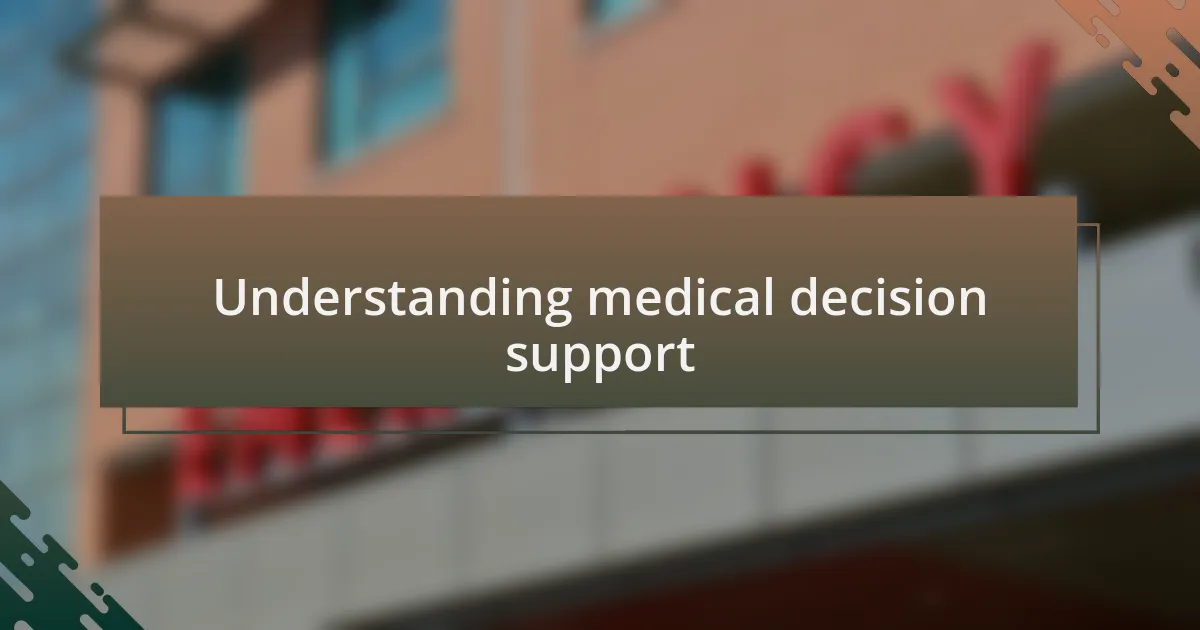
Understanding medical decision support
Medical decision support systems (MDSS) are tools designed to enhance the decision-making processes of healthcare professionals. I remember the first time I encountered an MDSS during a clinical rotation—it was eye-opening to see how quickly it could sift through vast amounts of data to provide evidence-based recommendations. This technology not only streamlines workflows but also adds a layer of confidence for clinicians under pressure.
Imagine facing a complex diagnosis with many variables at play. How do you ensure that every perspective is considered? That’s where MDSS shines. I’ve witnessed situations where these systems integrate diverse clinical guidelines, allowing for decisions that reflect a broad range of experiences and knowledge. It’s fascinating to think about how technology can capture different viewpoints and ultimately lead to better patient outcomes.
Moreover, understanding the nuances of MDSS goes beyond just functionality; it involves appreciating its role in shaping healthcare delivery. When I see providers collaborate with engineers to refine these systems, I feel the energy of innovation that emerges. This collaborative spirit drives us toward a future where diverse perspectives are not just acknowledged but are integral to the decision-making process. Isn’t that what healthcare should strive for?
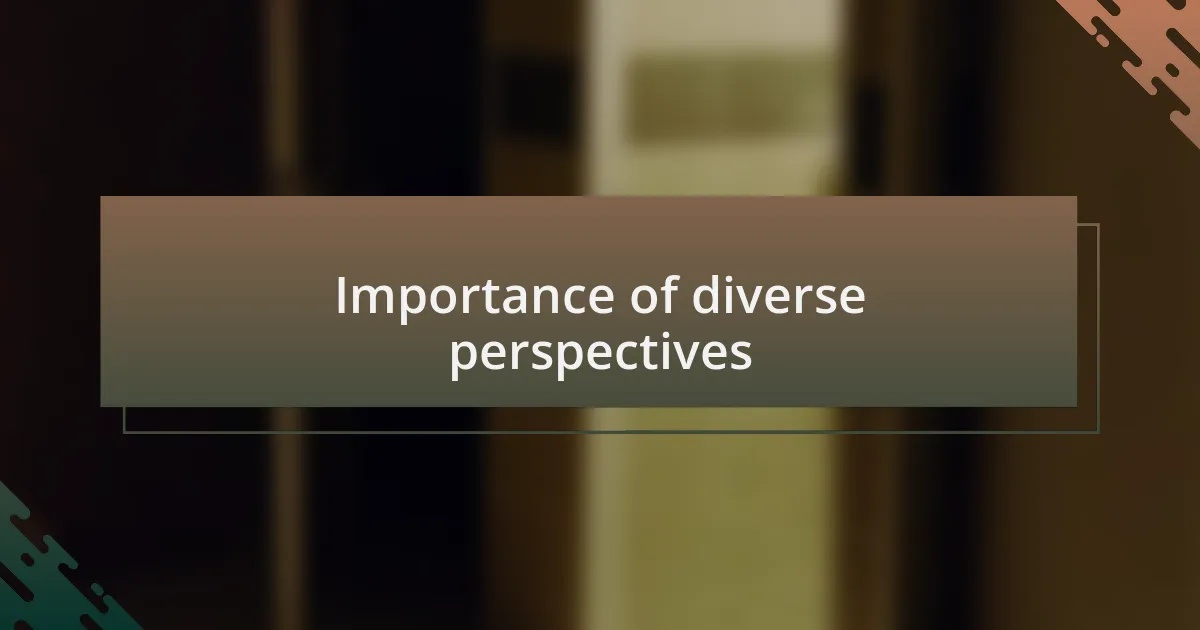
Importance of diverse perspectives
Diverse perspectives are crucial in medical decision-making because they enrich the understanding of complex patient scenarios. I remember a case where a patient’s treatment options varied significantly based on cultural beliefs, which a singular viewpoint might have overlooked. Engaging with a variety of perspectives didn’t just enhance the treatment plan; it fostered trust between the patient and the healthcare team, paving the way for better adherence and outcomes.
It’s striking how a diverse set of opinions can highlight gaps in evidence that one might not consider. In my experience, collaborating with colleagues from different backgrounds has opened my eyes to alternative treatment approaches I hadn’t previously considered. Have you ever felt that moment of clarity when a fresh perspective sheds new light on a familiar problem? That’s the power of inclusivity in healthcare—when voices are heard, we unlock potential solutions that could transform patient care.
The implications of diverse perspectives go beyond simply improving outcomes; they foster an environment of learning and growth. There have been moments in multidisciplinary meetings when a nurse’s insight led to a breakthrough in our approach to a patient’s care. These exchanges remind me that diversity isn’t just a box to check; it’s the essence of innovation in medicine. How often do we pause to appreciate the benefits this variety brings to our decision-making toolbox?
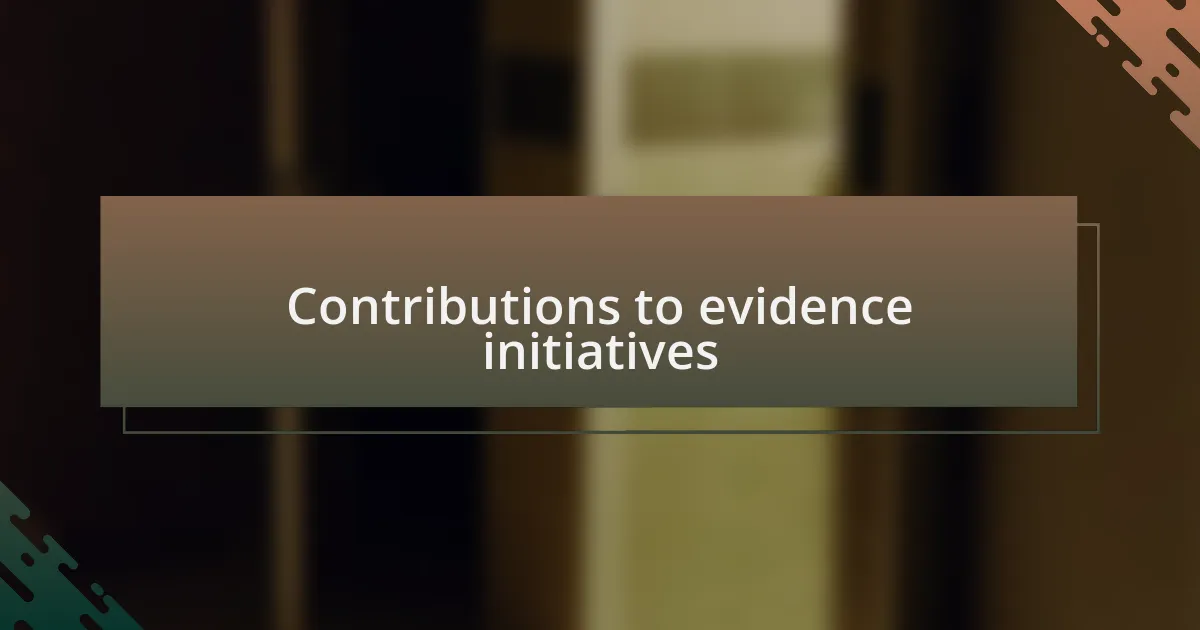
Contributions to evidence initiatives
Contributions to evidence initiatives are foundational in carving a path toward holistic patient care. I can recall a project where we gathered data from various community focus groups, each offering unique insights that shaped our outcomes. It was a revelation to see how feedback from a traditionally underrepresented demographic led us to adjust our recommended practices, ultimately making our findings more relevant and impactful.
I often find myself reflecting on the stories behind the data we collect. There was a study I participated in that examined medication adherence across different socioeconomic backgrounds. What struck me was how the quantitative findings only told part of the story; the qualitative insights from patients revealed fears and barriers that numbers couldn’t convey. This blend of evidence not only enriched our recommendations but also forged deeper connections between clinicians and their communities.
The commitment to incorporate diverse perspectives into evidence initiatives often requires ongoing dialogue among stakeholders. I remember facilitating a discussion with patients and providers, where candid conversations unearthed assumptions we’d made about pain management strategies. Engaging in that dialogue made me realize the value of empathy in clinical practice—after all, how can we truly serve patients without first understanding their lived experiences?
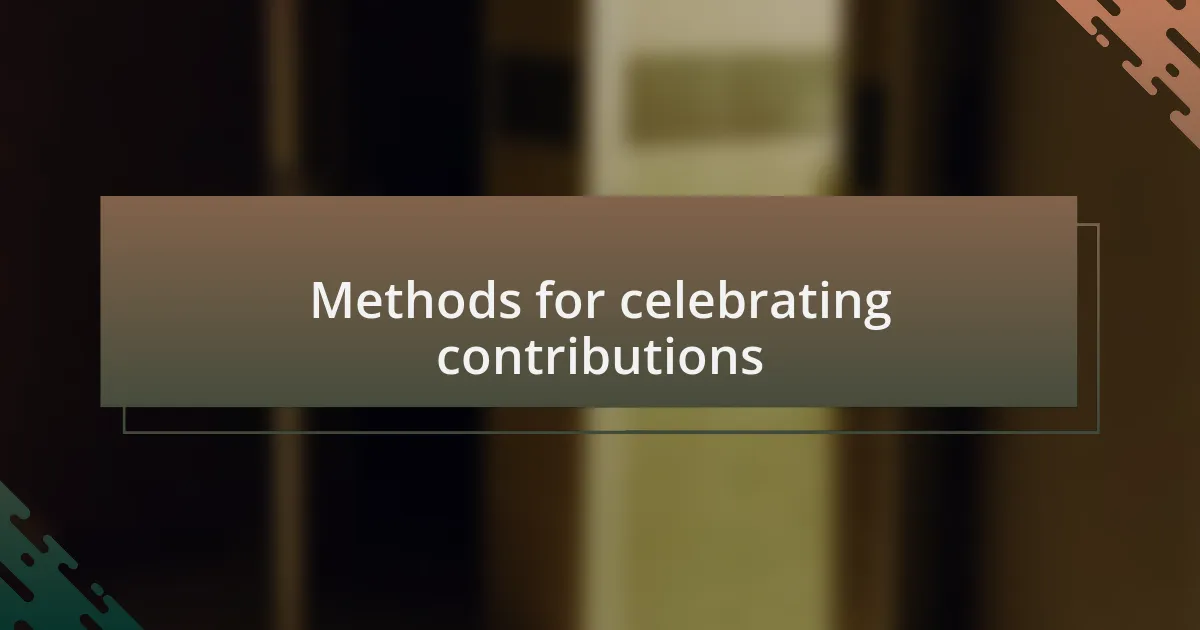
Methods for celebrating contributions
Celebrating contributions can take many forms, from formal recognition events to simple gestures of appreciation. I remember organizing a small gathering after a significant project, where we shared stories about what each team member had contributed. The atmosphere was filled with gratitude, and it struck me how powerful acknowledgment can be in motivating continued engagement.
Another method I’ve found effective is creating a dedicated platform for showcasing these contributions. For instance, in one initiative, we developed a newsletter that highlighted individual achievements and shared quotes from participants about their experiences. It was inspiring to see how this not only boosted morale but also encouraged others to participate more actively. Isn’t it amazing how a few words of appreciation can spark a desire to contribute even more?
I believe personal connections are key to celebrating contributions authentically. During a workshop I led, I encouraged participants to share their personal stories that drove their passion for the project. The emotional resonance created that day was palpable; it reinforced our shared goals and inspired everyone to push boundaries. Have you ever noticed how personal stories can transform a group dynamic? It’s remarkable how recognizing individual journeys can strengthen team cohesion and foster a culture of inclusivity.
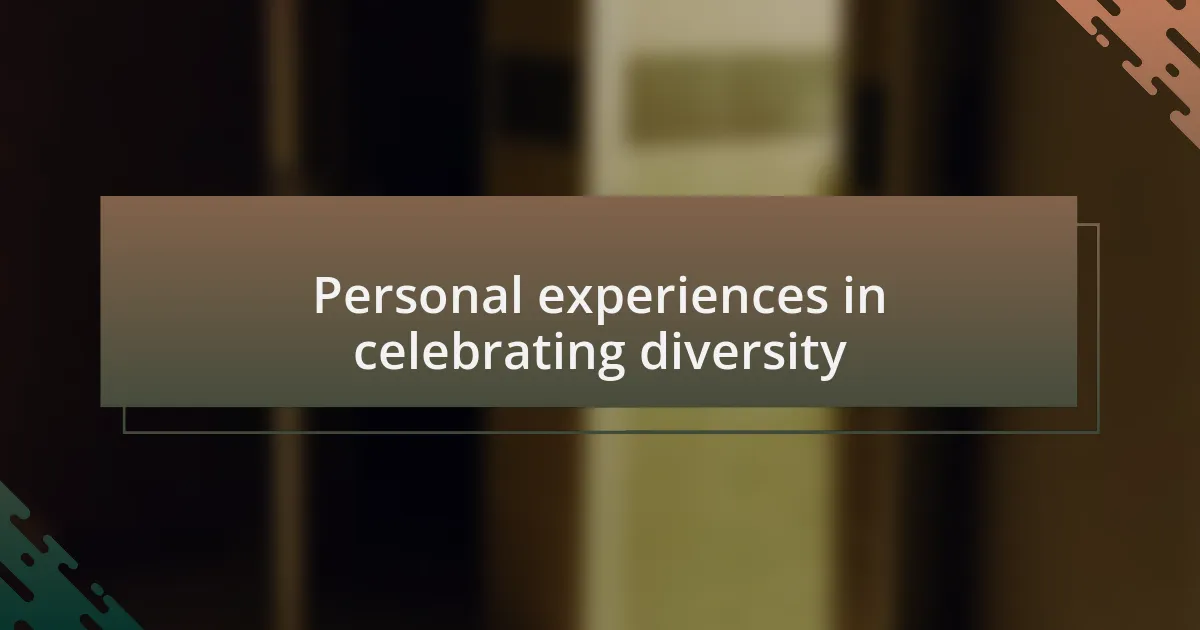
Personal experiences in celebrating diversity
I recall a memorable moment during a community health fair where I volunteered. Many different cultures were represented, and I took the time to engage with each participant about their background and experiences. I found it humbling and enlightening; sharing those stories enriched not just my understanding of diverse perspectives, but also deepened the connections we built that day. Have you ever been surprised by how much you can learn from simply listening to someone else’s story?
One particularly impactful experience was when I facilitated a discussion among a diverse group of medical professionals. Each participant brought unique insights shaped by their culture and training. As we shared our differing viewpoints on patient care, I was struck by the realization that diversity isn’t just about representation; it’s about actively listening and valuing what each person brings to the table. It made me wonder, how often do we miss out on innovative solutions because we fail to embrace the wealth of perspectives around us?
In my experience, celebrating diversity means finding joy in differences. I remember attending a panel where speakers from various backgrounds shared how their identities influenced their approach to healthcare. Their stories were both eye-opening and inspiring. It reinforced my belief that diversity should be celebrated every day, not just at special events. Have you ever felt that spark of creativity emerge when someone shares a perspective you’ve never considered before? Those moments can be the catalysts for profound change.
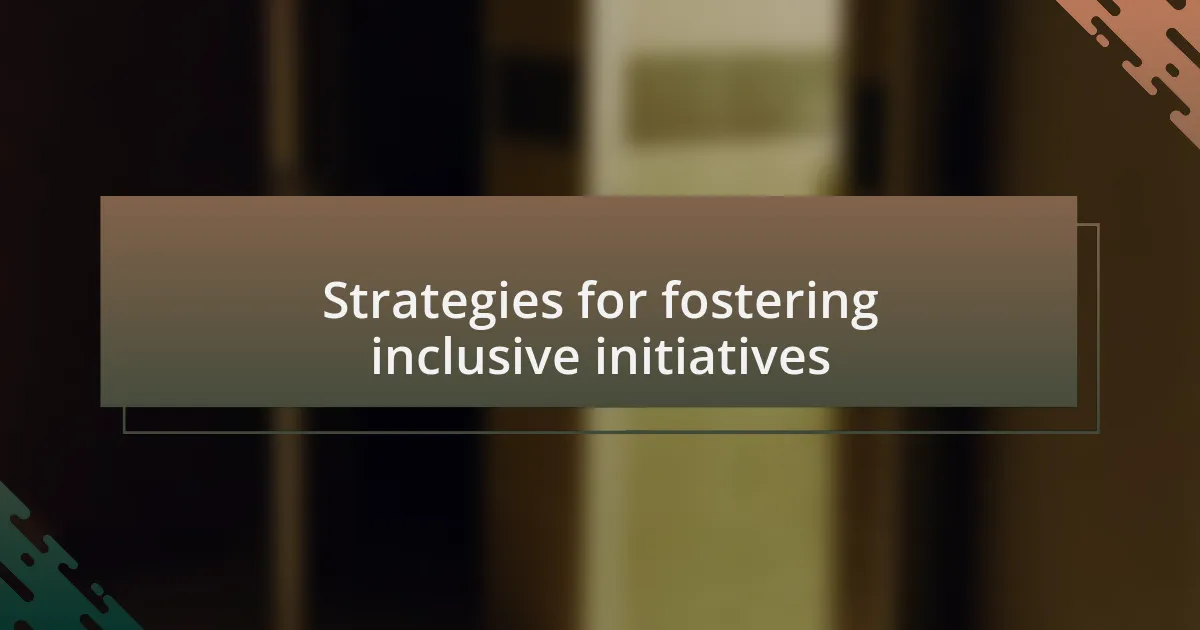
Strategies for fostering inclusive initiatives
Creating inclusive initiatives begins with actively seeking diverse voices in decision-making processes. For instance, I remember attending a workshop where facilitators deliberately recruited participants from underrepresented communities. The diverse group brought forth ideas that challenged the conventional wisdom I had formed over the years. Isn’t it fascinating how different backgrounds can reshape our understanding of complex health issues?
In my experience, establishing safe spaces for open dialogue is crucial. During a project I led, we organized regular check-ins where team members could express their thoughts and concerns without fear of judgment. This not only encouraged honest communication but also fostered a sense of belonging. How often do we overlook the importance of psychological safety in collaborative environments?
Another effective strategy involves training programs that emphasize cultural competence. When I participated in one such program, it opened my eyes to implicit biases I didn’t even realize I held. Engaging in role-play scenarios helped me empathize with patients from different backgrounds. I often wonder, if everyone had access to similar training, how different would our approach to healthcare be?
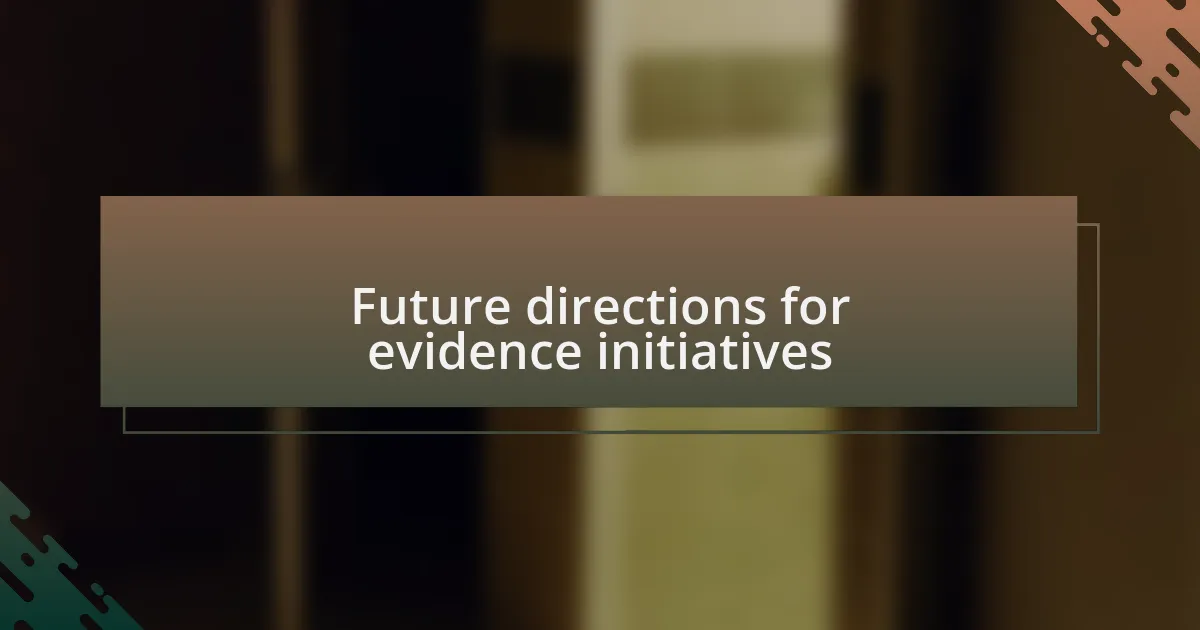
Future directions for evidence initiatives
As we look toward the future of evidence initiatives, an essential focus should be on integrating technology that amplifies diverse perspectives. In my journey with telemedicine, I’ve witnessed firsthand how virtual platforms can bridge gaps and include voices from remote areas that traditionally go unheard. It makes me curious—what untapped insights might we find by leveraging such technologies to gather real-world data from varied demographics?
Another direction involves fostering partnerships with community organizations that have established trust within diverse populations. Last year, I collaborated with a nonprofit dedicated to maternal health in underserved communities. Their knowledge was invaluable, revealing specific cultural nuances that could impact clinical decision-making. It makes me think—how can we systematically weave these community insights into our evidence frameworks?
Lastly, we must prioritize adaptive frameworks in our initiatives, allowing for continual feedback from the communities we serve. I recall a project that had a flexible approach, enabling us to pivot quickly based on real-time input. This adaptability not only improved outcomes but also cultivated trust, illustrating the power of co-creation in evidence generation. Have we fully appreciated how this iterative process could redefine our understanding of health data?